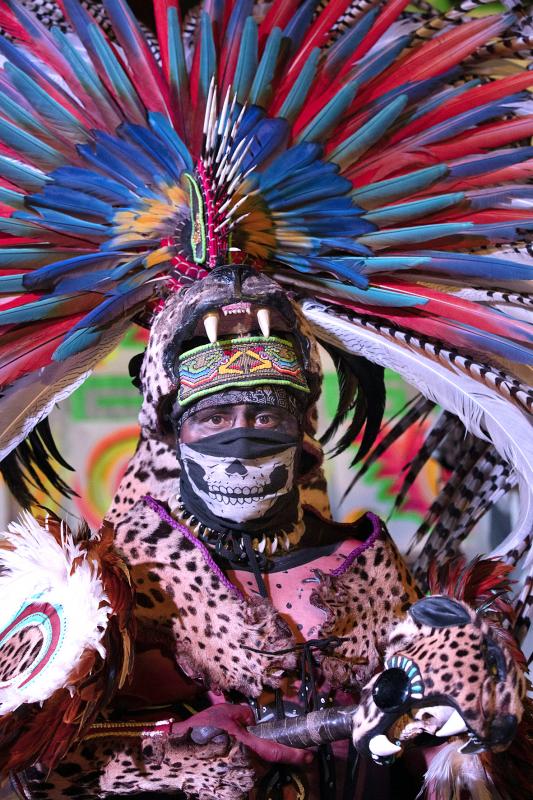A disconsolate mother dressed in white wanders through Mexico City’s floating gardens looking for her children killed by COVID-19, in a pandemic-era adaptation of a legend rooted in Aztec mythology.
The traditional play La Llorona (The Weeping Woman) returns to the UNESCO World Heritage Site of Xochimilco ahead of the Day of the Dead with a poignant tribute to the victims of COVID-19.
The ghost with flowing black hair, who according to legend reappears every year searching for her downed children, has spread throughout Latin America.

Photo: AP
“It’s dedicated to the memory of all the people who left without saying goodbye to their loved ones and for all the families who have suffered this loss,” Nayeli Cortes, who has played the role of the weeping mother for 11 years, said.
Measures such as face masks made of transparent plastic or cloth and a smaller audience enabled the 27-year-old performance and its flamboyant costumes to survive the pandemic.
COVID-19 has killed 86,000 people in Mexico, one of the world’s highest tolls, and as in other countries kept people apart from their families.
“Not being able to hug, hold hands or kiss (relatives) is very frustrating and that’s why right now it’s dedicated to them,” said stage director Maria Luisa Castillo.
“We know that they are here with us and it is the homage that we can give them, and also to tell them, ‘Here we are. We remember you. You will never be forgotten.’”
According to experts, the legend of the wandering ghost was first documented around 1550. It is associated with supposed dire omens prior to the Spanish conquest that predicted the end of the Tenochtitlan empire 500 years ago.
The audience watched the show from the gondolas that ply the canals of Xochimilco, which usually attracts about a million tourists a year but was shut for almost six months due to the pandemic.
Hugo Cruz, a 46-year-old driver, said that it was important to keep the legend alive for future generations.
“If we don’t instill (the traditions) in our children then it’s going to be lost,” he said. “I think that we’re the only country that worships death in this way.”
The Day of the Dead, celebrated in Mexico on the first two days of November, is believed to be when the gateway separating the living and the deceased opens.
This year the festival known for its bright colors and elaborate costumes will be a more subdued, scaled down affair due to the pandemic.

May 11 to May 18 The original Taichung Railway Station was long thought to have been completely razed. Opening on May 15, 1905, the one-story wooden structure soon outgrew its purpose and was replaced in 1917 by a grandiose, Western-style station. During construction on the third-generation station in 2017, workers discovered the service pit for the original station’s locomotive depot. A year later, a small wooden building on site was determined by historians to be the first stationmaster’s office, built around 1908. With these findings, the Taichung Railway Station Cultural Park now boasts that it has

The latest Formosa poll released at the end of last month shows confidence in President William Lai (賴清德) plunged 8.1 percent, while satisfaction with the Lai administration fared worse with a drop of 8.5 percent. Those lacking confidence in Lai jumped by 6 percent and dissatisfaction in his administration spiked up 6.7 percent. Confidence in Lai is still strong at 48.6 percent, compared to 43 percent lacking confidence — but this is his worst result overall since he took office. For the first time, dissatisfaction with his administration surpassed satisfaction, 47.3 to 47.1 percent. Though statistically a tie, for most

Six weeks before I embarked on a research mission in Kyoto, I was sitting alone at a bar counter in Melbourne. Next to me, a woman was bragging loudly to a friend: She, too, was heading to Kyoto, I quickly discerned. Except her trip was in four months. And she’d just pulled an all-nighter booking restaurant reservations. As I snooped on the conversation, I broke out in a sweat, panicking because I’d yet to secure a single table. Then I remembered: Eating well in Japan is absolutely not something to lose sleep over. It’s true that the best-known institutions book up faster

In February of this year the Taipei Times reported on the visit of Lienchiang County Commissioner Wang Chung-ming (王忠銘) of the Chinese Nationalist Party (KMT) and a delegation to a lantern festival in Fuzhou’s Mawei District in Fujian Province. “Today, Mawei and Matsu jointly marked the lantern festival,” Wang was quoted as saying, adding that both sides “being of one people,” is a cause for joy. Wang was passing around a common claim of officials of the People’s Republic of China (PRC) and the PRC’s allies and supporters in Taiwan — KMT and the Taiwan People’s Party — and elsewhere: Taiwan and